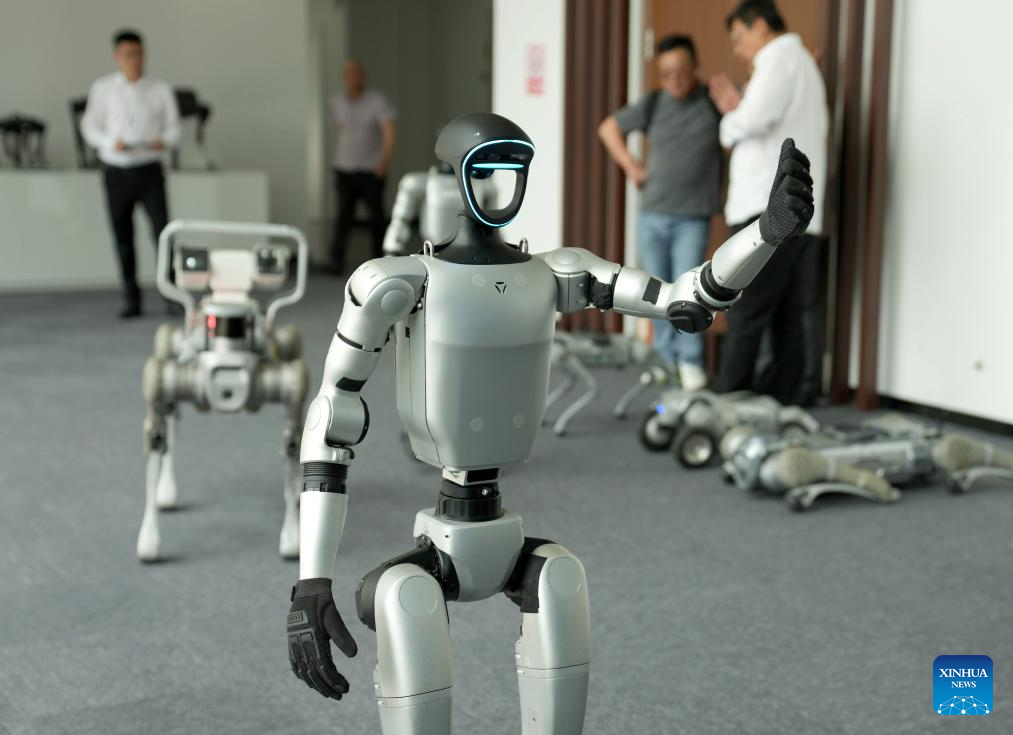
During the May Day holiday, many study tour agencies rolled out robotics and artificial intelligence-related programs following the surge in popularity of humanoid robots and DeepSeek.
In Hangzhou, Zhejiang province, six of the city's leading startups — collectively known as the "six little dragons" — have attracted significant attention, leading many eager parents to arrange visits for their children. On social media platforms, a four-day, three-night tech exploration camp featuring keywords such as "Decoding China's Silicon Valley", "Zhejiang University", "Alibaba" and "Robotics" was promoted by multiple agencies.
Targeting children ages 8 to 16, the itinerary includes visits to the "six little dragons" future technology experience center, robotics town explorations, tours of Zhejiang University and AI courses at Alibaba. Notably, the tours do not take students to the actual startups, but rather to an exhibition center showcasing their innovations.
According to the West Lake Culture and Tourism official account, the center opened in March. Visitors can take part in interactive experiences, including taking quizzes with AI "superbrains", shaking hands with robots, interacting with scenes from the AAA video game Black Myth: Wukong and watching synchronized robotic dog dances.
On Fliggy, an online travel booking platform, half-day group tickets for the tour are priced at 298 yuan ($41) per person, 560 yuan for one adult and one child, and 760 yuan for two adults and one child.
Similar tech-themed programs have emerged in other cities. In Beijing, a three-day "Chinese Academy of Sciences AI MOSS robot training camp" costs 4,580 yuan, targeting third graders and above, with accommodation included. Shanghai offers a one-day "Fudan University+ Deep-Seek" camp at 398 yuan per child, while a three-day "Bay Area Tech Exploration AI Camp" in Shenzhen, Guangdong province, costs 2,680 yuan for youths ages 12 to 17.
Two agencies organizing the Beijing MOSS robot camp told Economic View, the financial news arm of China News Service, that they reported strong demand: One sold out its 40 slots, while another had only 10 spots remaining. Participants are primarily from Beijing and nearby regions.
Interactive elements are a key selling point. The Hangzhou exhibition, for example, includes hands-on robotics control and AI classes. An organizer based in Harbin, Heilongjiang province, noted that robotics programs thrive due to their immersive, educational appeal, allowing children to engage directly with cutting-edge technology.
Wu Liyun, a professor at Beijing International Studies University, attributed the trend to parents' desire to keep children abreast of technological advancements and build strengths in tech.
"AI's rapid integration across industries has heightened parental interest. These programs, blending education and entertainment, resonate with families," she said.
Some camps also position themselves as career preparatory experiences. Tang Xiaomin, organizer of Shenzhen's AI camp, highlighted its appeal to families considering further education in Hong Kong, as participation can enrich academic portfolios. Similarly, a Beijing parent whose child attended the MOSS camp said it's more competition-oriented than recreational.
Wu noted that such programs reflect AI's expanding industrial footprint, with tourism amplifying its reach. Companies in Anhui province and Zhejiang, for instance, are developing augmented reality-powered study tours, she said.
Notably, several robotics firms — including Shenzhen EngineAI Robotics Technology Co and Hangzhou-based Deep Robotics — have warned against unauthorized paid visits, clarifying that they do not offer public tours. The companies urged caution against scalpers, some of whom have sold fake tickets for as much as 3,000 yuan.
















